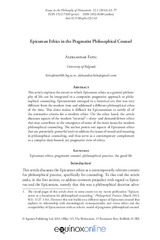Epicurean ethics in the pragmatist philosophical counsel
Чланак у часопису (Објављена верзија)
Метаподаци
Приказ свих података о документуАпстракт
The paper explores the extent to which Epicurean ethics as a general philosophy of life can be integrated in a composite pragmatist approach to philosophical counseling. Epicureanism emerged in a historical era that was very different from the modern time and addressed a different philosophical ethos of the time. This alone makes it difficult for Epicureanism to satisfy all of the normative criteria for a modern ethics. On the other hand, the paper discusses aspects of the modern ‘external’, duty- and demand-driven ethics that may contribute to the emergence of some of the main issues for modern philosophical counseling. The author points out aspects of Epicurean ethics that are potentially powerful tools to address the issues of mood and meaning in philosophical counseling, and thus serve as a contemporary complement to a complex duty-bound, yet pragmatist view of ethics.
Извор:
Essays in the Philosophy of Humanism, 2014, 63-77Издавач:
- Washington : The American Humanist Association and The Institute for Humanist Studies
Колекције
Институција/група
IFDTTY - JOUR AU - Fatić, Aleksandar PY - 2014 UR - http://rifdt.instifdt.bg.ac.rs/123456789/339 AB - The paper explores the extent to which Epicurean ethics as a general philosophy of life can be integrated in a composite pragmatist approach to philosophical counseling. Epicureanism emerged in a historical era that was very different from the modern time and addressed a different philosophical ethos of the time. This alone makes it difficult for Epicureanism to satisfy all of the normative criteria for a modern ethics. On the other hand, the paper discusses aspects of the modern ‘external’, duty- and demand-driven ethics that may contribute to the emergence of some of the main issues for modern philosophical counseling. The author points out aspects of Epicurean ethics that are potentially powerful tools to address the issues of mood and meaning in philosophical counseling, and thus serve as a contemporary complement to a complex duty-bound, yet pragmatist view of ethics. PB - Washington : The American Humanist Association and The Institute for Humanist Studies T2 - Essays in the Philosophy of Humanism T1 - Epicurean ethics in the pragmatist philosophical counsel SP - 63 EP - 77 DO - 10.1558/eph.v22i1.63 ER -
@article{
editor = "Shook, John",
author = "Fatić, Aleksandar",
year = "2014",
abstract = "The paper explores the extent to which Epicurean ethics as a general philosophy of life can be integrated in a composite pragmatist approach to philosophical counseling. Epicureanism emerged in a historical era that was very different from the modern time and addressed a different philosophical ethos of the time. This alone makes it difficult for Epicureanism to satisfy all of the normative criteria for a modern ethics. On the other hand, the paper discusses aspects of the modern ‘external’, duty- and demand-driven ethics that may contribute to the emergence of some of the main issues for modern philosophical counseling. The author points out aspects of Epicurean ethics that are potentially powerful tools to address the issues of mood and meaning in philosophical counseling, and thus serve as a contemporary complement to a complex duty-bound, yet pragmatist view of ethics.",
publisher = "Washington : The American Humanist Association and The Institute for Humanist Studies",
journal = "Essays in the Philosophy of Humanism",
title = "Epicurean ethics in the pragmatist philosophical counsel",
pages = "63-77",
doi = "10.1558/eph.v22i1.63"
}
Shook, J.,& Fatić, A.. (2014). Epicurean ethics in the pragmatist philosophical counsel. in Essays in the Philosophy of Humanism Washington : The American Humanist Association and The Institute for Humanist Studies., 63-77. https://doi.org/10.1558/eph.v22i1.63
Shook J, Fatić A. Epicurean ethics in the pragmatist philosophical counsel. in Essays in the Philosophy of Humanism. 2014;:63-77. doi:10.1558/eph.v22i1.63 .
Shook, John, Fatić, Aleksandar, "Epicurean ethics in the pragmatist philosophical counsel" in Essays in the Philosophy of Humanism (2014):63-77, https://doi.org/10.1558/eph.v22i1.63 . .



